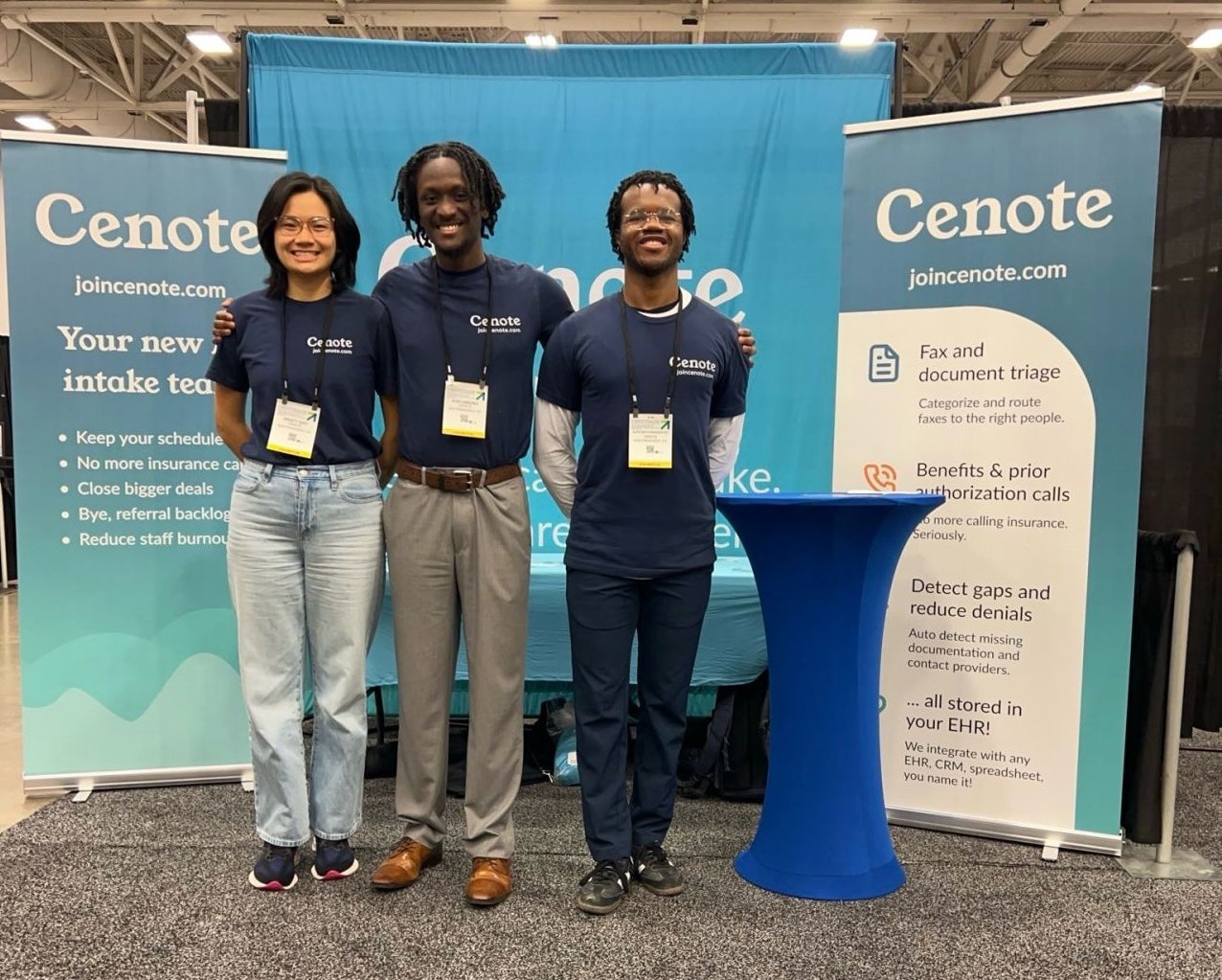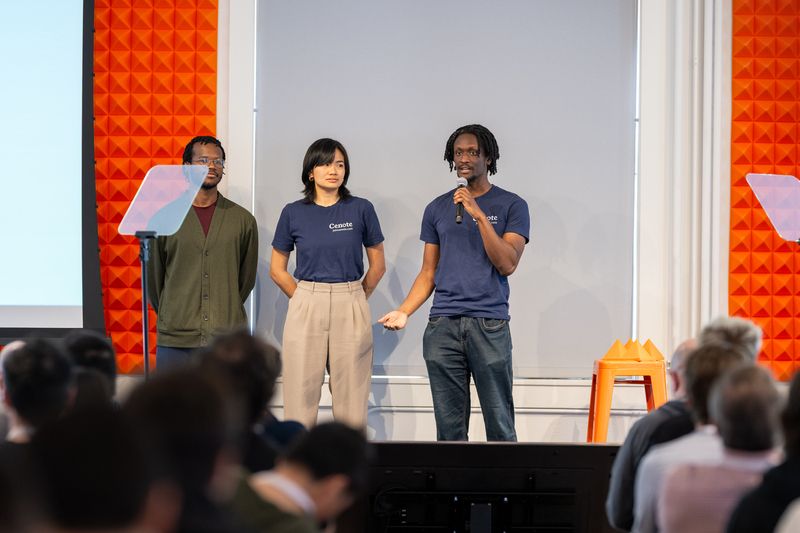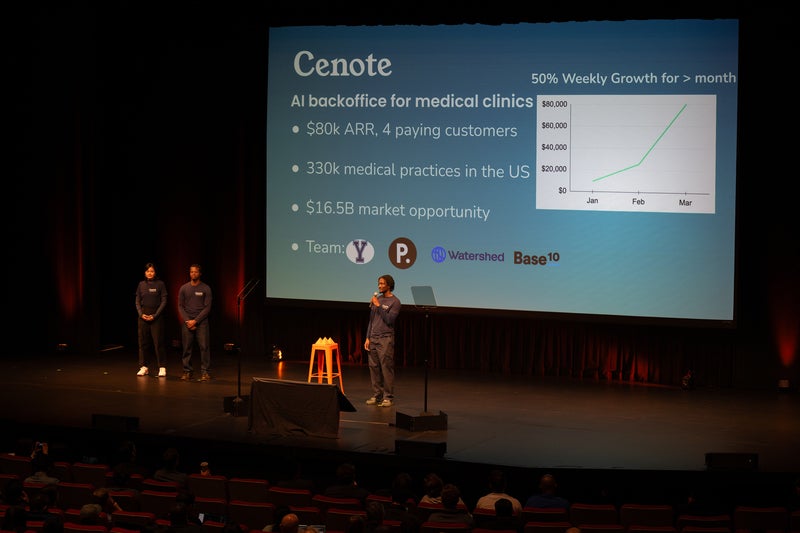A lot has happened to Kristy Gao (BCS ’22) since graduating from the University of Waterloo, nearly three years ago.
She moved to San Francisco for her first post-graduation job. Started a book club to make friends. Got into an accident, where she, a Canadian, had to navigate the complexities of the American healthcare system. Quit her job to launch a health-tech startup, Cenote, with two people she met from her book club. Applied to Y Combinator (YC), the world’s largest and most competitive startup accelerator. Got accepted by YC and received $500,000 USD in seed funding.
We connected with our alum about her unique entrepreneurship journey, her passion for diversity, equity and inclusive (DEI) initiatives, and her words to her younger self.

Kristy Gao with her co-founders Ajani Smith-Washington (left) and Kofi Ansong (right). Her health-tech startup, Cenote, was accepted to Y Combinator for the Winter 2025 batch. Cenote joins past YC recipients like Airbnb, Twitch, and Reddit.
What is Cenote? What problems are you trying to solve?
At Cenote, we automate back-office tasks for specialist medical clinics using AI.
Many of these clinics still fax each other for patient referrals and requests. It means opening a fax and thinking, “Is this enough information about the patient to give to insurance, so our provider can get paid?” The answer is often no. So, they have to decide what information they’re missing and ask for it from the original provider. When they have all the information, they have to call insurance to see if it can cover the operation. Once they meet the insurance company’s eligibility, then the provider can perform the service.
Our goal is to automate everything from that first fax to getting the patient scheduled in. By straightening out the data, patients will get seen faster and providers can deliver services faster and get paid promptly.
Kristy providing a demo on her product. This innovative AI software accelerates the patient referral process by extracting essential patient information in real-time, eliminating back-and-forth phone calls with insurance and tedious fax triages for clinics.
What inspired you to create this software? Was there a particular event?
When I moved to San Francisco for my first job, I unfortunately got into an accident. It was very stressful as a Canadian who knew nothing about American healthcare, and as a new grad who was kind of broke.
When I went to the ER, I kept asking a ton of questions like, “Is this covered by insurance? Am I screwed?” The doctors and nurses were like. “As long as you have insurance, you're fine.”
Afterwards, getting the billing sorted out was a nightmare. I had to call insurance multiple times to dispute four different claims. They rejected one of the claims dispute, so I had to file a case with California’s Department of Insurance to look at it again. Eventually, they were willing to fold on that.
When I was at the hospital, the staff told me I could get the follow-up surgery within a month and then I’d be good to go. But because of insurance and finding the right in-network providers, I didn’t get the surgery for another six months.
That was quite a life-changing experience. When my co-founders and I were thinking about ideas to work on, I remembered that experience. I thought, “Wow, there's certainly stuff in healthcare that is inefficient and could be worked on.” It felt like a right opportunity.
Some of our readers may be unfamiliar with the American healthcare system. To help their understanding, could you please compare it to the Canadian healthcare system?
Based on my personal experience in San Francisco, it was such a nightmare getting that ER visit cleared out and getting the follow-up care I needed.
In Ontario, most providers work with the Ontario Health Insurance Plan (OHIP), a public healthcare plan. If a doctor is doing an OHIP procedure, they bill OHIP and just remember OHIP’s rules on how to get paid. In America, there’s a mosaic of different insurance companies a provider might work with. If you're working with five different insurances, you have to memorize the rules for each. You have to call each insurance to deal with bills and claims. So, the process for providers to operate and get paid is not as streamlined as in Canada.
YC is the world’s biggest startup accelerator. Its alumni include Airbnb, Twitch and Reddit, and its acceptance rate is less than 1%. How do you feel about being a recipient?
It’s a real privilege to be a recipient. YC can take any company to the next level, not just with their funding, but also their resources at hand like their network and mentorship.
Recipients of YC receive $500,000 and a possibility of additional seed funding. How will your startup use this funding? Any future plans?
An interesting thing about what we're building is that it's very sales-forward. Every clinic is different. Also, the healthcare industry is a very in-person industry. These people aren't reachable on LinkedIn. So, a lot of the funds will go towards going to conferences and getting in front of people to sell our product. As we grow — and this is common with many startups — a lot of the funds will go toward hiring employees for sales and engineering.
A year ago, you quit your job as a software engineer to work at Cenote full time. Many may see this as a risky move. Could you please walk us through your decision- and thought-making process?
The ladder for software engineers is that you either become a senior software engineer or an engineering manager, where you manage projects and other engineers.
Last year, I felt that neither career path was for me and something had to change. On top of that, I had been interested in starting a company with friends. I always thought the challenge would be really fun. I think those two things put together led to my decision to take this leap of faith.
Leaving behind a job and a lifestyle that you've had for a few years, to start a company is a scary thing to do. There's an additional complication where if I quit my job, I couldn't stay in the US anymore because I didn't have a work visa. I actually moved back home to Guelph for three months. But what I also thought was scary is, if I'd regret not trying.
What is the biggest challenge you face as an entrepreneur? How did you overcome it?
As the co-founder, there are three things on my plate: building the product, sales support, and security.
Sales have been really tough for me to learn. There’s a difference between being social and being social for sales. It’s like going to a party and trying to sell your product to everyone. Talking to everyone at a party is hard enough! Like, doing a cold call or e-mail can be scary. Going to a conference, trying to shake someone's hand and tell them about your company is another level scary. To become a good salesperson, you have to reach a level of being okay with being uncomfortable and I'm still working on that.
But sales is a craft. You have to put the time and work into it. There are some great books, like The Mom Test by Rob Fitzpatrick. It's less on sales and more on how to think through solving people's problems. There's also Founding Sales by Pete Kazanjy, which was probably the most influential book to me. It’s on how to do sales at a company you founded. Also, my co-founders are very supportive and coached me through sales.

Cenote at Medtrade, an international trade conference focusing on medical equipment
How did your education experience at Waterloo prepare you for your career?
I think the co-op program is a great way to speed run the early years of your career. If I didn’t go through co-op, I think it would have taken me much longer to get to where I am, in terms of knowing what I want to do and competency. Like six internships? That's one and a half years of work experience before you even graduate. You either do it at Waterloo or when you graduate.
If you're interested in entrepreneurship, working at a wide variety of companies will probably be up your alley. You're probably interested in entrepreneurship because you like wearing different hats and using different skills that you have. Co-op can test how you feel about things, rapidly. That could mean working for a small or big company. That might mean trying product design, then software engineering and then project management. I really encourage people to experiment and find what makes them happy.

Kristy has held various co-op positions, from small companies like Kitchener-Waterloo’s Magnet Forensics to big companies like PayPal and Google to international companies like Cognite AS in Norway.
You started the SoGal Chapter at Waterloo, which focuses on closing the diversity gap in entrepreneurship and venture capital. You were also involved in several tech-inclusive initiatives at UWaterloo like TechPlus and Women in Computer Science (WiCS).
If we don't look out for each other, who will, when you’re an underrepresented person in this industry? I think it's as simple as that for me.
How do you plan on harnessing diversity and inclusion in your current career path?
It’s twofold. One goal is through my company. When we start to hire, I will care deeply about diversity and inclusion. The second is paying it forward. I've had a lot of great mentors throughout the years and a lot of great help to get to where I am. So, I fully intend on giving back to my community, and that can mean mentoring people from underrepresented backgrounds.

Kristy at her convocation, held in June 2022
What would you tell your first-year self?
Enjoy it, live in the moment. I had my university experiences cut short by the pandemic. If I knew I only had two years of being in university and living on campus, I think I would have tried much harder to enjoy the first two years.
Anything else you want to add?
If anyone has any connections with clinics or healthcare businesses, we'd love to chat.



